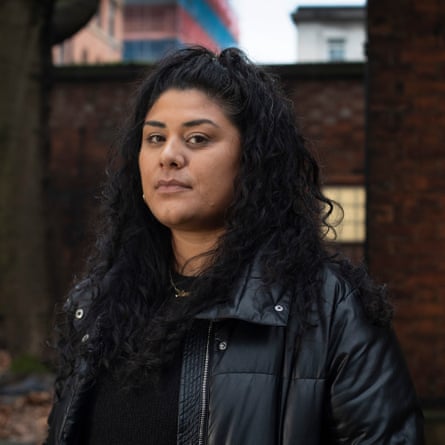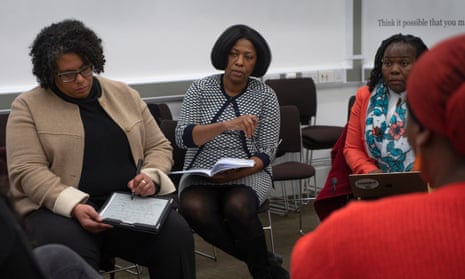The UN working group of experts on people of African descent last paid a visit to the UK in 2012. The country has transformed dramatically since then, with many people reeling from the impact of austerity measures, Brexit and the coronavirus pandemic.
For Catherine Namakula, a human rights professor at the University of the Free State in Bloemfontein, South Africa, who chairs the working group, the bewildering changes that have taken place make it difficult to compare and contrast their previous findings with what they have witnessed on their most recent visit. Yet, one thing is clear: the situation for young people of African descent is “highly concerning”.
“There’s no safe place for young people,” she said at the end of an open public meeting in the BBC building in Salford, adding that children of African descent were overpoliced in their homes, schools and wider communities. “The law is in conflict with children of African descent, instead of the children being in conflict with it. They’re not breaking the law, the law is breaking our children.”
In the last two weeks, Namakula, Barbara Reynolds, an education specialist and the group’s vice-chair, and Dominique Day, a human rights attorney, have visited London, Birmingham, Manchester and Bristol as part of a 10-day fact-finding mission. They listened and spoke to representatives from the government, local authorities, the Equality and Human Rights Commission, academics, lawyers, and members of grassroots organisations.
It was testimonies from individuals that proved to be the most powerful, painting a stark picture of the daily injustices experienced by black people in the UK, particularly black children.
At the Friend’s House community centre in Manchester on a grey Wednesday afternoon, Namakula, Reynolds and Day sat in a circle to listen to two representatives from Kids of Colour, Fowsia Cali and Mea Aitken, and Zara Manoehoetoe, a youth worker.
“There isn’t anywhere for the kids to go to exist as they are,” Cali told the group.

Manoehoetoe said: “What happens with safeguarding to young people, they choose not to access support because to them it’s safer not to. It’s safer to mitigate the harms themselves, and stay away from professionals and practitioners, or from parents.”
Manoehoetoe gave an example: “If there’s a situation at home where there isn’t enough food, rather than somebody bringing them some food, they’re going to be removed from the home. The problem isn’t with the home, the problem is access to funds.”
The group spoke about the Child Q case, in which a young black girl was strip-searched while at school after being falsely accused of carrying cannabis, and a joint enterprise case that sparked fury across the local community as black teenagers were jailed as result of conversations on Telegram.
Aitken told the working group that police in schools were affecting young people’s learning. “The environment that you want for young people in school is supposed to be a space in which they’re able to learn and able to grow. But actually, they’re walking down the hallway of their school feeling on edge because they don’t know if they’re going to get pulled up by this officer.”
after newsletter promotion
The working group then went to Salford, where a community meeting was held. The people who turned up were a mix of Windrush campaigners, lawyers, community organisers, local councillors and young students. One by one, people put up their hands to share their testimony with the UN experts.
Michael, a 19-year-old student, spoke of the exorbitant fees young people have to pay to keep their British residency permit up to date. “You’re expected to pay £3,000 or more. My brother paid at least £7,000 to the lawyers to put his [application] in. If you cannot afford it, that’s you being kicked out of the country. I’ve been here since I was 10, this is my home.”
The group talked about disparities in maternal health, stop and search, black students punished in schools for wearing their natural hairstyles, and what some deemed to be the betrayal of the Windrush generation on a local and national level.
Before the experts arrived in the UK, there was an opportunity for individuals and groups to make submissions for them to read. Many people did. The evidence, particularly the data on disparity, was plain to see, Namakula said.
But she added it was concerning “to see how much the government is less committed to handling the matters. You see the conduct of the police throughout these inquests as being not accountable. So it becomes this clarity of the extent of responsibility towards Africans. It’s almost in black and white.”
